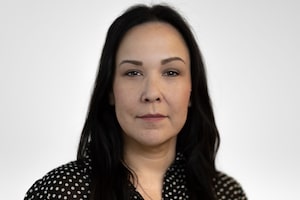Canada's Minister of Indigenous Services Patty Hajdu and Assembly of First Nations Regional Chief Cindy Woodhouse in Ottawa on Jan. 4. Ms. Hajdu said she’s spoken with Chief Lefty Kamenawatamin to ensure Bearskin Lake has the supports it needs.PATRICK DOYLE/Reuters
A remote community in Northwestern Ontario is calling for military assistance after a COVID-19 outbreak that has infected close to half its residents, including vulnerable elders and children, while a region-wide lockdown restricting non-essential travel is now in effect.
Chief Lefty Kamenawatamin from Bearskin Lake First Nation said 186 cases have been confirmed so far in the community of more than 400 people, affecting approximately 55 households, including his own. He has been isolating since Monday when his adult son tested positive. His daughter previously tested positive and was sent to isolate at the community centre, which is now at capacity. Mr. Kamenawatamin’s tests have been negative so far.
Mr. Kamenawatamin said the community’s resources are close to breaking point as the already limited essential staff are among those getting infected. He declared a state of emergency on Dec. 28.
He said a small group of fewer than 20 community members he calls his “army” is burning out, working around the clock helping those in isolation with things such as getting groceries, delivering firewood and picking up medications.
“They’re really working under extreme stress conditions; anxiety levels are high,” he said.
“On top of that, I don’t have a medical driver. I don’t even have a medical vehicle. And there’s nobody to answer the phones at the nursing station and there’s nobody to answer the phone at the band office.”
Mr. Kamenawatamin made his initial plea for help in a news release on Monday when he said health care and front-line workers from outside the community were urgently needed. The release said day-to-day operations are crippled as they contend with a poorly resourced public health care system, few nurses, severe overcrowding, and no space to operate testing and isolation centres.
Wes Nothing, Bearskin Lake’s health director and one of two technicians conducting COVID-19 tests for the past week, said they are now determining which households are negative and enlisting the members of these households as essential workers.
About 80 per cent of the community is fully vaccinated and children began to get their first doses in December, Mr. Kamenawatamin said. But as the virus spreads within overcrowded, multigenerational homes where people cannot safely isolate, he worries about elders with underlying health issues and children.
Remote communities such as Bearskin Lake are hundreds of kilometres from hospitals and patients have to be flown out by air ambulance if treatment is needed.
Pimicikamak Cree Nation in Northern Manitoba is facing what Chief David Monias called a “super spread situation” because of overcrowding and a lack of adequate housing.
The community of about 8,500 people has 233 active cases, and has closed its boundaries and gas stations. It is limiting nursing services to emergencies and vaccines as it also faces a nursing shortage.
“They’re really overworked because they work until 3 o’clock in the morning, go home and come back for their 8 a.m. shift,” Mr. Monias said.
“That’s all they can do right now. They don’t have the manpower to do testing in the nursing station so what they do now is the rapid antigen test ... even though they are less reliable.”
About 93 per cent of adults in Pimicikamak are vaccinated. And when the community experienced an outbreak last winter, it received military assistance, Mr. Monias said. It’s something he said could help again but he added that the community is not counting on that as the only option.
“We decided that we’re in this alone. Nobody is going to come and help us out, so we have to act as if we are working on our own so we’re trying our best we can to stop the spread,” he said.
Indigenous Services Minister Patty Hajdu said she’s spoken with Mr. Kamenawatamin to ensure Bearskin Lake has the supports it needs. And while she said she hasn’t seen a formal request for military assistance, she is working with Defence Minister Anita Anand to deploy Canadian Rangers until it’s determined what kind of skill set is required in Bearskin Lake.
In the meantime, Ms. Hajdu said the government will cover expenses for charter flights for food and for individuals going into the community to help.
Indigenous Services spokesperson Kyle Fournier said the department has approved more than $900,000 in the past week for Bearskin Lake for security measures, food security, PPE and prevention supplies, isolation and accommodation setup, transportation and worker wages.
Surrounding communities have also rallied and responded to the outbreak, raising tens of thousands of dollars and co-ordinating the delivery of other essential supplies such as air purifiers, water, groceries and firewood by plane and convoys of trucks and skidoos on the winter road.
Chiefs in the Sioux Lookout First Nations Health Authority district that includes Bearskin Lake have also implemented a region-wide lockdown prohibiting non-essential travel to and from any of the remote communities.
Our Morning Update and Evening Update newsletters are written by Globe editors, giving you a concise summary of the day’s most important headlines. Sign up today.
 Willow Fiddler
Willow Fiddler